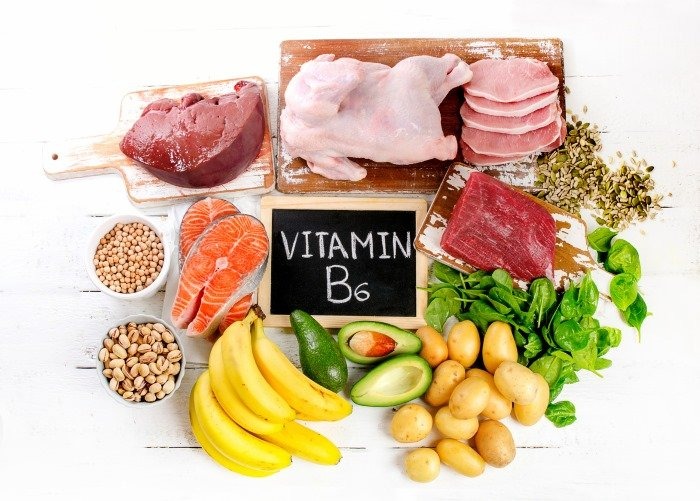Pyridoxine (Vitamin B6)
Vitamin B6 is a group of nutrients that are required for the synthesis of pyridoxal phosphate, a coenzyme involved in more than 100 different metabolic processes.
Types
Like the other B vitamins, vitamin B6 is a family of related compounds, such as:
Pyridoxine: This form is found in fruits, vegetables and grains, as well as supplements. Processed foods may also contain added pyridoxine.
Pyridoxamine: Used until recently in dietary supplements in the US. However, the FDA now considers pyridoxamine a pharmaceutical drug. Pyridoxamine phosphate is a common form of vitamin B6 in animal-sourced foods.
Pyridoxal: Pyridoxal phosphate is the main type of vitamin B6 in animal-sourced foods.
In the liver, all dietary forms of vitamin B6 are converted into pyridoxal 5-phosphate, the active form of the vitamin.
Role and Function
- Like other B vitamins, vitamin B6 acts as a coenzyme in numerous chemical reactions.
- It is involved in red blood cell formation as well as energy and amino acid metabolism. It is also required for the release of glucose (sugar) from glycogen, the molecule the body uses to store carbs.
- Vitamin B6 also supports the formation of white blood cells and helps the body synthesize several neurotransmitters.
Dietary Sources
- Vitamin B6 is found in a wide variety of foods. The chart below shows some of its richest sources and their content.
- Other good sources include tuna, pork, turkey, bananas, chickpeas and potatoes. Vitamin B6 is also added to breakfast cereals and soy-based meat substitutes.
- The availability of this vitamin is generally higher in animal-sourced foods, compared to plant foods.
Recommended Intake
The table below shows the RDA for vitamin B6. The RDA is the daily intake estimated to be sufficient for most people.
The RDA hasn’t been established for infants, so the adequate intake (AI) is presented instead.
RDA (mg/day) UL (mg/day)
Infants 0–6 months 0.1* –
7–12 months 0.3* –
Children 1–3 years 0.5 30
4–8 years 0.6 40
9–13 years 1.0 60
Women 14–18 years 1.2 80
19–50 years 1.3 100
51+ years 1.5 100
Men 14–18 years 1.3 80
19–50 years 1.3 100
51+ years 1.7 100
Pregnancy 1.9 80–100
Lactation 2.0 80–100
*Adequate intake
Deficiency
- Vitamin B6 deficiency is rare. People with alcoholism are at the greatest risk.
- The main symptoms include anemia, skin rashes, convulsions, confusion and depression.
- Deficiency has also been associated with an increased risk of cancer.
Side Effects and Toxicity
- Naturally occurring vitamin B6 from food does not seem to have any adverse effects.
- In contrast, very large supplemental doses of pyridoxine — 2,000 mg per day or more — are linked to sensory nerve damage and skin lesions.
- High intake of pyridoxine supplements may also suppress milk production in breastfeeding women.
Benefits of Supplements
- Large doses of pyridoxine have been used to treat carpal tunnel syndrome and premenstrual syndrome.
- However, its benefits are controversial. No strong evidence proves that pyridoxine supplements are an effective treatment for these conditions.
- Because of the adverse health effects of high-dose pyridoxine supplements, they should only be taken under medical supervision.
Summary of Vitamin B6
- Vitamin B6 is a group of nutrients that are required for the formation of pyridoxal phosphate, a coenzyme that plays a vital role in numerous metabolic pathways.
- The richest dietary sources are liver, salmon, sunflower seeds and pistachio nuts, to name a few.
- Deficiency is rare, although regularly drinking high amounts of alcohol may raise the risk.
- High supplemental doses may cause nerve damage and skin lesions, but getting vitamin B6 from food doesn’t appear to have any negative effects.
- While adequate vitamin B6 intake is healthy, no good evidence demonstrates that vitamin B6 supplements are useful in the treatment of diseases.

